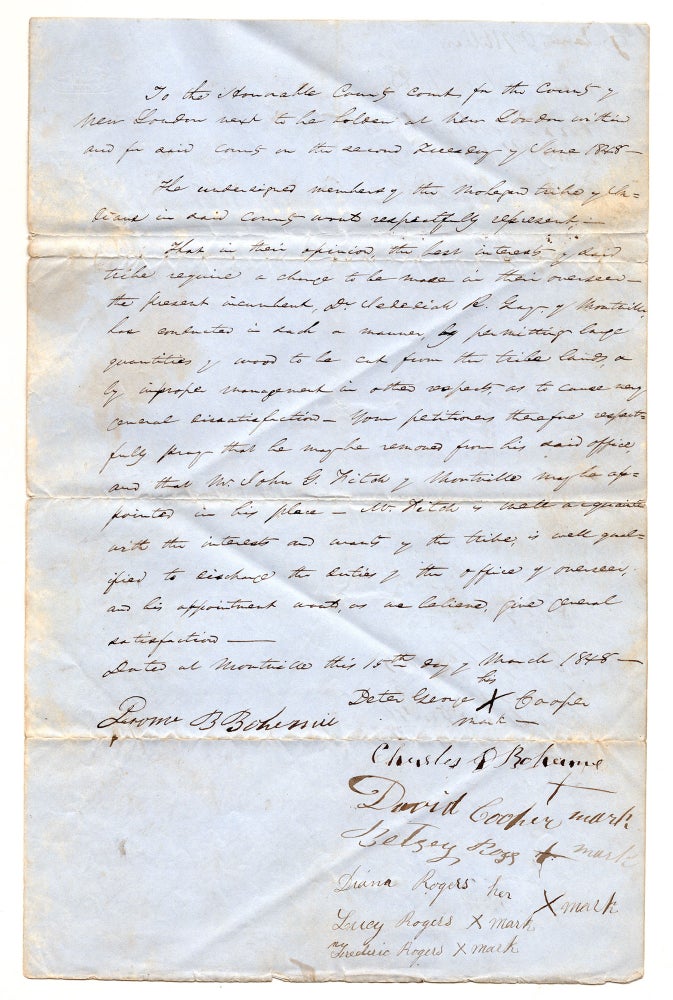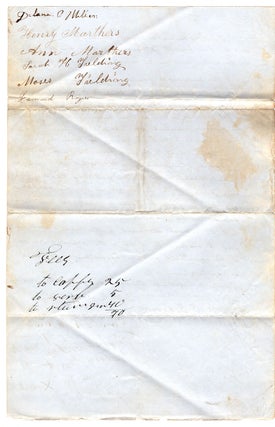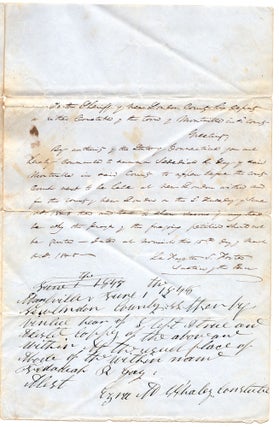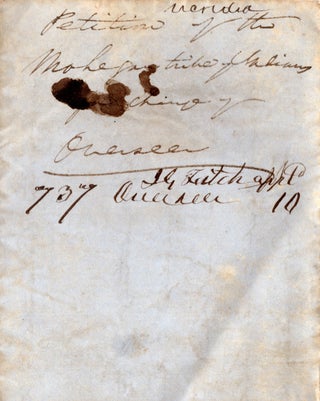The undersigned members of the Mohegan Tribe of Indians in said County… require a change to be made in their overseer…
Montville, Connecticut, 15 March 1848; 1 June 1848. 4to (12.25” x 8”), toned blue paper. 3 pp. manuscript, with Mohegan “signatures,” some in the same hand, half accompanied by “X” signatures. Docketed on page 4, “Petition mem[oran]da of the Mohegan tribe of Indians for change of overseer. 737 J. G. Fitch app[oin]t[e]d overseer 10.” CONDITION: Good, 4.5” separation along old vertical fold, but no losses to the text. A fascinating legal document in which the Mohegan people of New London, Connecticut—men and women alike—charge their overseer with improperly permitting the removal of wood from their land and recommend a candidate to replace him. The female signatures on this document bear witness to the traditionally central role of women in Mohegan society. Submitted to the New London County Court on 15 March 1848, the document is signed by fourteen members of the Mohegan tribe, both male (8) and female (6), and expresses their view that “the best interest of said tribe requires a change to be made in their overseer.” They explain that the present incumbent, Dr. Jedidiah R. Gay of Montville has conducted in such a manner, by permitting large quantities of wood to be cut from the tribe lands & by improper management in other respects, as to cause very general dissatisfaction. Your petitioners therefore respectfully pray that he may be removed from his said office and that Mr. John G. Fitch of Montville may be appointed in his place. Mr. Fitch is well acquainted with the interests and wants of the tribe, is well qualified to discharge the duties of the office of overseer, and his appointment [?], as we believe, give general satisfaction. Below this are the signatures of Lucy, Diana, Leonard, and Frederic Rogers, David Cooper, Betsey Ross, Charles D. and Jerome B. Boheme, Delana O. Miller, Henry Marthers, Peter George Cooper, Ann Marthers, and Moses and Sarah H. Fielding. A short list of legal fees is recorded on page two. The text on page three is dated 15 March 1848 and is addressed to the sheriff of New London County, ordering him to summon Dr. Jedidiah R. Gay before the court on 2 June 1848, in order “to show reasons if any there by why the prayer of the foregoing petition should not be granted.” A note by constable Ezra M. Whaley dated 1 June 1848 follows. Whaley states that a copy of the above summons was delivered to the abode of Jedidiah Gay. Docketing on page four reads in part, “J. G. Fitch app[oin]t[e]d overseer,” indicating that the tribe’s petition was successful. Born in Montville, Connecticut, John G. Fitch (1798–1875) apparently served as an overseer for the Mohegan tribe in the 1830s before being reappointed to the position in 1848. An 1838 document held at Yale records overseer Fitch petitioning for school money for the tribe. The centuries-long and often tumultuous relationship between the Fitch family and the Mohegan Indians has been explored by Wendy B. St. Jean in her essay “Inventing Guardianship: The Mohegan Indians and Their ‘Protectors’” (The New England Quarterly, Sep., 1999). An Algonquian-speaking people, the Mohegans originally occupied most of the upper Thames valley in present-day Connecticut, their traditional economy based on growing corn, hunting and fishing. When Europeans first settled in New England, the Mohegan and Pequot tribes were ruled jointly by the Pequot chief, Sassacus. Later, a rebellion by the sub-chief Uncas led to Mohegan independence. After the destruction of the Pequot in 1637, most Pequot survivors and the former Pequot territories came under Mohegan sovereignty. At the close of King Philip’s War, the Mohegans were the dominant native people in southern New England. Colonial settlements gradually displaced them, and their numbers shrank from imported diseases and other difficulties. Today, there are some 2,500 Mohegan descendants. The federally recognized tribe lives on a reservation in the eastern upper Thames River valley of south-central Connecticut. The tribe is one of two in the state, the other being the Mashantucket Pequot whose reservation is located in Ledyard. An important document reflecting the bad faith management of Mohegan interests by a negligent or unscrupulous overseer and the role of Mohegan women in addressing land issues. REFERENCES: St. Jean, Wendy B. “Inventing Guardianship: The Mohegan Indians and Their ‘Protectors,’” The New England Quarterly, Sep., 1999, Vol. 72, No. 3, pp. 362-387; Mohegan people at britannica.com; Petition of John Fitch Overseer of the Mohegan Indians Praying for School Money at yale.edu
Item #7544
Sold





